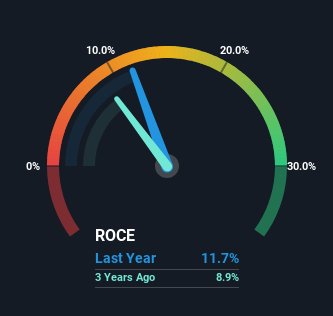- United States
- /
- Machinery
- /
- NasdaqGS:MIDD
Investors Met With Slowing Returns on Capital At Middleby (NASDAQ:MIDD)

What are the early trends we should look for to identify a stock that could multiply in value over the long term? One common approach is to try and find a company with returns on capital employed (ROCE) that are increasing, in conjunction with a growing amount of capital employed. This shows us that it's a compounding machine, able to continually reinvest its earnings back into the business and generate higher returns. With that in mind, the ROCE of Middleby (NASDAQ:MIDD) looks decent, right now, so lets see what the trend of returns can tell us.
Return On Capital Employed (ROCE): What Is It?
Just to clarify if you're unsure, ROCE is a metric for evaluating how much pre-tax income (in percentage terms) a company earns on the capital invested in its business. Analysts use this formula to calculate it for Middleby:
Return on Capital Employed = Earnings Before Interest and Tax (EBIT) ÷ (Total Assets - Current Liabilities)
0.12 = US$712m ÷ (US$6.9b - US$841m) (Based on the trailing twelve months to March 2024).
Thus, Middleby has an ROCE of 12%. In absolute terms, that's a pretty normal return, and it's somewhat close to the Machinery industry average of 13%.
Check out our latest analysis for Middleby

In the above chart we have measured Middleby's prior ROCE against its prior performance, but the future is arguably more important. If you'd like to see what analysts are forecasting going forward, you should check out our free analyst report for Middleby .
How Are Returns Trending?
The trend of ROCE doesn't stand out much, but returns on a whole are decent. Over the past five years, ROCE has remained relatively flat at around 12% and the business has deployed 48% more capital into its operations. 12% is a pretty standard return, and it provides some comfort knowing that Middleby has consistently earned this amount. Over long periods of time, returns like these might not be too exciting, but with consistency they can pay off in terms of share price returns.
The Bottom Line
To sum it up, Middleby has simply been reinvesting capital steadily, at those decent rates of return. Despite the good fundamentals, total returns from the stock have been virtually flat over the last five years. For that reason, savvy investors might want to look further into this company in case it's a prime investment.
Like most companies, Middleby does come with some risks, and we've found 1 warning sign that you should be aware of.
For those who like to invest in solid companies, check out this free list of companies with solid balance sheets and high returns on equity.
New: Manage All Your Stock Portfolios in One Place
We've created the ultimate portfolio companion for stock investors, and it's free.
• Connect an unlimited number of Portfolios and see your total in one currency
• Be alerted to new Warning Signs or Risks via email or mobile
• Track the Fair Value of your stocks
Have feedback on this article? Concerned about the content? Get in touch with us directly. Alternatively, email editorial-team (at) simplywallst.com.
This article by Simply Wall St is general in nature. We provide commentary based on historical data and analyst forecasts only using an unbiased methodology and our articles are not intended to be financial advice. It does not constitute a recommendation to buy or sell any stock, and does not take account of your objectives, or your financial situation. We aim to bring you long-term focused analysis driven by fundamental data. Note that our analysis may not factor in the latest price-sensitive company announcements or qualitative material. Simply Wall St has no position in any stocks mentioned.
Have feedback on this article? Concerned about the content? Get in touch with us directly. Alternatively, email editorial-team@simplywallst.com
About NasdaqGS:MIDD
Middleby
Designs, manufactures, markets, distributes, and services commercial restaurant, food processing, and residential kitchen equipment worldwide.
Solid track record with adequate balance sheet.
Similar Companies
Market Insights
Community Narratives



